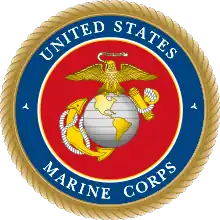| Deputy Commandant For Aviation | |
|---|---|
| DCA | |
| Reports to | Commandant of the Marine Corps |
| Seat | The Pentagon, Arlington County, Virginia, U.S. |
| Appointer | Commandant of the Marine Corps |
| First holder | Alfred A. Cunningham |
| Deputy | Assistant Deputy Commandant for Aviation |
| Website | |
The Deputy Commandant for Aviation (DCA) is the United States Marine Corps' principal advisor on all aviation matters and is the spokesperson for Marine Corps Aviation programs, requirements, and strategy throughout the Department of the Navy and the Department of Defense.[1] DCA is normally the highest-ranking naval aviator in the Marine Corps and reports directly to the Commandant of the Marine Corps. The role of DCA is an administrative position and has no operational command authority over United States Marine Corps Aviation forces.
DCA tour lengths have varied over the years based on war time requirements and personnel turnover. For the last two decades, typical tour lengths have been approximately three years. The billet is normally held by a lieutenant general. DCA and Headquarters Marine Corps Aviation work out of The Pentagon in Arlington County, Virginia.
Responsibilities
The Deputy Commandant for Aviation is responsible for developing, integrating, and supervising plans, policies, and budgets for all aviation assets and aviation expeditionary enablers (aviation command and control, aviation-ground support, and unmanned aircraft systems) in support of Marine air ground task forces.[1]
History
The Aviation Section, Headquarters Marine Corps was established in 1919. In charge initially was the Officer in Charge, Aviation. He was responsible to both the Commandant of the Marine Corps and the Director of Naval Aviation for all Marine Corps related aviation matters. In 1920, Congress authorized Marine Corps Aviation to maintain a strength of approximately one-fifth the size of the Marine Corps. In 1936 the Aviation Section was renamed the Aviation Division and the billet was changed to the Director of Aviation.[2] In 1962 the name was again changed to Deputy Chief of Staff (Air). The current moniker of Deputy Commandant for Aviation began in Jun 1998.[3]
List of Deputy Commandants for Aviation
| # | Picture | Name | Rank | Term | Notes | ||
|---|---|---|---|---|---|---|---|
| Took office | Left office | Duration | |||||
| 1 | 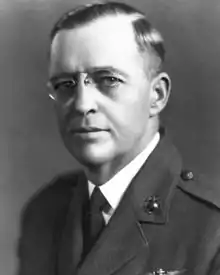 |
Alfred A. Cunningham[4] | Major | 17 November 1919 | 12 December 1920 | 1 year, 25 days | Naval Aviator #5.[5] He was the first Marine Corps aviator.[6] World War I. |
| 2 |  |
Thomas C. Turner[7] | Lieutenant colonel | 13 December 1920 | 2 March 1925 | 4 years, 79 days | Naval Aviator #772.[5] Distinguished Flying Cross; served in the Philippines, at Veracruz and in Haiti. During WWI, at the request of Hap Arnold, served as the OinC of flying at the Army's Ellington Field.[8] |
| 3 |  |
Edwin H. Brainard[9] | Major | 3 March 1925 | 9 May 1929 | 4 years, 67 days | Naval Aviator #2982. Recipient of the Navy Cross for his actions during the Champagne Offensive in October 1918 while serving as the Commanding Officer of the 1st Battalion, 15th Field Artillery Regiment.[10] Obtained the Marine Corps' first cargo plane in 1927.[9] |
| 4 |  |
Thomas C. Turner[11] | Colonel | 10 May 1929 | 28 October 1931 | 2 years, 171 days | See #2 above. The nine day gap between Col Turner and Maj Geiger was due to Col Turner being killed by a whirling propeller blade in Haiti on 28 October 1928. |
| 5 |  |
Roy Geiger[4] | Major | 6 November 1931 | 29 May 1935 | 3 years, 204 days | Naval Aviator #49.[5] Two time recipient of the Navy Cross. Served as the Commanding General of the 1st Marine Aircraft Wing during the Battle of Guadalcanal[12] and Commanding General of the III Marine Amphibious Corps during the Battle of Okinawa. Also the only Marine to ever command a field army when he temporarily took command of the Tenth Army after the death of Simon Bolivar Buckner Jr.[13] |
| 6 | 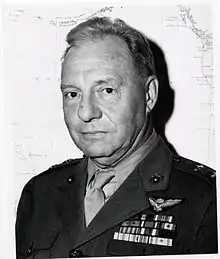 |
Ross E. Rowell[14] | Colonel | 30 May 1935 | 10 March 1939 | 3 years, 284 days | Navy Distinguished Service Medal, Distinguished Flying Cross; Served in Nicaragua and flew at the Battle of Ocotal,[15] was Commanding General, Marine Aircraft Wings Pacific during World War II. |
| 7 |  |
Ralph J. Mitchell[4] | Brigadier General | 11 March 1939 | 29 March 1943 | 4 years, 18 days | Navy and Army Distinguished Service Medals; Distinguished Flying Cross from Nicaraguan Campaign. |
| 8 |  |
Roy Geiger[16] | Major General | 13 May 1943 | 15 October 1943 | 155 days | See #5 above. |
| 9 |  |
Louis E. Woods[4] | Brigadier General | 15 October 1943 | 17 July 1944 | 276 days | Veteran Guadalcanal Campaign, veteran Okinawa Campaign, Navy Distinguished Service Medal, Commander of the Most Excellent Order of the British Empire; commanding general, 2nd Marine Aircraft Wing |
| 10 |  |
Field Harris[4] | Major General | 18 July 1944 | 24 February 1948 | 3 years, 221 days | Graduate U.S. Naval Academy; Lieutenant general; Navy and Army Distinguished Service Medals |
| 11 |  |
William J. Wallace[4] | Major General | 24 February 1948 | 1 September 1950 | 2 years, 189 days | Navy Distinguished Service Medal; Guadalcanal Campaign & Battle of Okinawa |
| 12 |  |
Clayton C. Jerome[4] | Brigadier General | 1 September 1950 | 1 April 1952 | 1 year, 213 days | Retired at Lieutenant General; Commanded both 1st and 2d MAW; veteran of Nicaraguan Campaign, Yangtze Patrol, Solomon Islands campaign, Bougainville campaign, Philippines campaign and the Korean War. |
| 13 |  |
William O. Brice[3] | Lieutenant General | 1 April 1952 | 31 July 1955 | 3 years, 121 days | Navy Distinguished Service Medal, Veteran of World War II, having fought at Guadalcanal, and the Korea; also served as Commanding General of Fleet Marine Force, Pacific. |
| 14 | 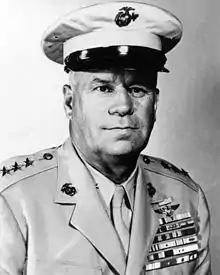 |
Christian F. Schilt[3] | Lieutenant General | 1 August 1955 | 31 March 1957 | 1 year, 242 days | Medal of Honor; General; Veteran World War I, United States occupation of Haiti, United States occupation of Nicaragua, and World War II[17] |
| 15 | 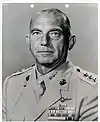 |
Verne J. McCaul[3] | Lieutenant General | 1 April 1957 | 2 December 1957 | 245 days | Assistant Commandant of the Marine Corps; Veteran World War II and Korean War.[18] |
| 16 |  |
Samuel S. Jack[3] | Major General | 14 January 1958 | 20 February 1958 | 37 days | Veteran Nicaraguan Campaign, World War II and Korean War; Graduate of the U.S. Naval Academy; Recipient of the Navy Cross |
| 17 |  |
John C. Munn[19] | Major General | 21 February 1958 | 14 December 1959 | 1 year, 296 days | Silver Star; Guadalcanal Campaign & Battle of Okinawa; Korean War |
| 18 | 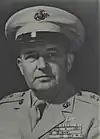 |
Albert F. Binney[3] | Major General | 15 December 1959 | 10 September 1961 | 1 year, 269 days | Veteran World War II and Korean War; commanding general 2nd Marine Aircraft Wing; graduate U.S. Naval Academy in 1928; |
| 19 |  |
Keith B. McCutcheon[3] | Colonel | 11 September 1961 | 17 February 1962 | 159 days | General; Distinguished Flying Cross; Army Silver Star Medal; Commanding Officer Marine Helicopter Squadron One (HMX-1); commanding general, III Marine Amphibious Force; McCutcheon Field at MCAS New River, North Carolina is named in his honor.[20] |
| 20 |  |
Marion E. Carl[3] | Colonel | 18 February 1962 | 4 July 1962 | 136 days | Twice awarded the Navy Cross; Battle of Midway & Guadalcanal Campaign; Vietnam War[21] |
| 21 |  |
Norman J. Anderson[3] | Brigadier General | 5 July 1962 | 20 October 1963 | 1 year, 107 days | Navy Distinguished Service Medal; Distinguished Flying Cross with three gold stars; Air Medal with two silver stars; graduate UCLA |
| 22 | 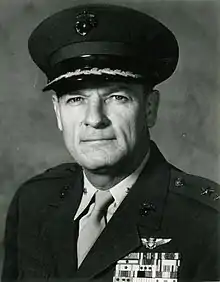 |
Louis B. Robertshaw[22] | Major General | 21 October 1963 | 15 June 1966 | 2 years, 237 days | Graduate U.S. Naval Academy; captain of the 1935 Naval Academy football team; Inspector General of the Marine Corps[22] |
| 23 |  |
Keith B. McCutcheon[3] | Major General | 15 June 1966 | 18 February 1970 | 3 years, 248 days | See #19 above. |
| 24 | 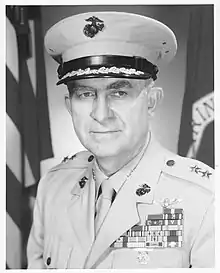 |
Homer S. Hill[3] | Major General | 19 February 1970 | 24 August 1972 | 2 years, 187 days | See #19 above. |
| 25 | _-_11_N0v_1971.jpg.webp) |
Edward S. Fris[3] | Major General | 25 August 1972 | 27 August 1974 | 2 years, 2 days | Lieutenant general; Veteran of World War II and Vietnam War; pioneer in the development of today's Marine Air Command and Control System (MACCS). |
| 26 |  |
Philip D. Shutler[3] | Brigadier General | 28 August 1974 | 19 January 1975 | 144 days | Lieutenant general; Veteran of Korean War and Vietnam War. |
| 27 |  |
Victor A. Armstrong[3] | Major General | 20 January 1975 | 21 August 1975 | 213 days | Lieutenant general; Veteran World War II; Korean War, and Vietnam War; Legion of Merit with Combat "V" and 2 gold stars; Distinguished Flying Cross with gold star |
| 28 |  |
Thomas H. Miller Jr.[3] | Lieutenant General | 22 August 1975 | 29 June 1979 | 3 years, 311 days | First American to fly the Hawker Siddeley Harrier.[23] |
| 29 |  |
William J. White[3] | Lieutenant General | 1 July 1979 | 30 June 1982 | 2 years, 364 days | Veteran Korean War, and Vietnam War; Legion of Merit with Combat "V"; Distinguished Flying Cross |
| 30 |  |
William H. Fitch[24] | Lieutenant General | 1 July 1982 | 31 August 1984 | 2 years, 61 days | Lieutenant general; Silver Star Medal |
| 31 | 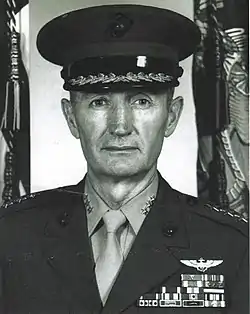 |
Keith A. Smith[3] | Lieutenant General | 1 September 1984 | 29 April 1988 | 3 years, 241 days | Lieutenant general; Distinguished Flying Cross |
| 32 |  |
Charles H. Pitman[3] | Lieutenant General | 1 July 1995 | 30 June 1999 | 3 years, 364 days | Lieutenant general; Silver Star Medal |
| 33 |  |
Duane A. Wills[3] | Lieutenant General | 17 August 1990 | 30 June 1993 | 2 years, 317 days | Lieutenant general; Veteran Vietnam War; Distinguished Flying Cross; lettered in football at UCLA; |
| 34 | 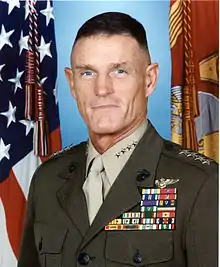 |
Richard D. Hearney[3] | Lieutenant General | 1 July 1993 | 14 July 1994 | 1 year, 13 days | Assistant Commandant of the Marine Corps; General; Served in the Vietnam War and Gulf War; Navy Distinguished Service Medal |
| 35 |  |
Harold W. Blot[3] | Lieutenant General | 15 July 1994 | 21 July 1996 | 2 years, 6 days | |
| 36 | 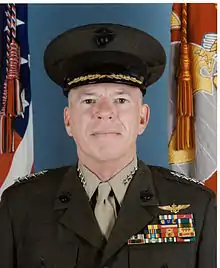 |
Terrence R. Dake[3] | Lieutenant General | 22 July 1996 | 28 June 1998 | 1 year, 341 days | |
| 37 |  |
Frederick McCorkle[25] | Lieutenant General | 28 June 1998 | 2 August 2001 | 3 years, 35 days | Vietnam War |
| 38 |  |
William L. Nyland[3] | Lieutenant General | 2 August 2001 | 10 September 2002 | 1 year, 39 days | Navy Distinguished Service Medal; Vietnam War[26] |
| 39 | 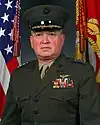 |
Michael A. Hough[3] | Lieutenant General | 3 October 2002 | 2 November 2005 | 3 years, 30 days | |
| 40 |  |
John G. Castellaw[3] | Lieutenant General | 3 November 2005 | 10 March 2007 | 1 year, 127 days | |
| 41 | 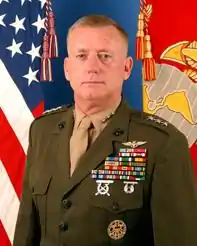 |
George J. Trautman III[27] | Lieutenant General | 5 July 2007 | 31 January 2011 | 3 years, 210 days | |
| 42 | 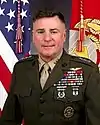 |
Terry G. Robling[28] | Lieutenant General | 31 January 2011 | 10 March 2012 | 1 year, 39 days | |
| 43 | 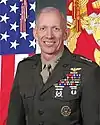 |
Robert E. Schmidle Jr. | Lieutenant General | 31 January 2012 | 31 January 2014 | 1 year, 210 days | |
| 44 | 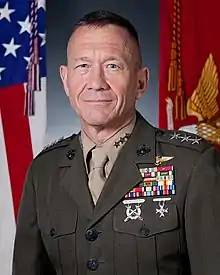 |
Jon M. Davis[29] | Lieutenant General | 31 January 2014 | 31 July 2017 | 3 years, 26 days | |
| 45 |  |
Steven R. Rudder | Lieutenant General | 11 July 2017 | 16 July 2020 | 2 years, 360 days | |
| 46 |  |
Mark R. Wise | Lieutenant General | 6 July 2020 | 27 July 2022 | 2 years, 21 days | |
| 47 | 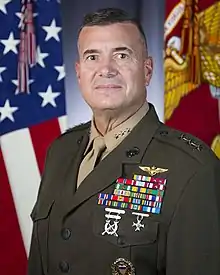 |
Michael Cederholm | Lieutenant General | 27 July 2022 | Incumbent | 1 year, 160 days | |
Timeline

Citations
 This article incorporates public domain material from websites or documents of the United States Marine Corps.
This article incorporates public domain material from websites or documents of the United States Marine Corps.
- 1 2 "Marine Aviation". marines.mil. United States Marine Corps. Retrieved 20 January 2020.
- ↑ Rottman 2002, pp. 384.
- 1 2 3 4 5 6 7 8 9 10 11 12 13 14 15 16 17 18 19 20 21 22 23 24 25 Kaufman 2012, pp. 315.
- 1 2 3 4 5 6 7 Sherrod 1952, pp. 433.
- 1 2 3 Kaufman 2012, pp. 314.
- ↑ Mersky 1983, pp. 2.
- ↑ Sherrod 1952, pp. 21.
- ↑ Sherrod 1952, pp. 19–21.
- 1 2 Sherrod 1952, pp. 27.
- ↑ "Edwin H. Brainard". www.valor.militarytimes.com. The Hall of Valor Project. Retrieved 20 January 2020.
- ↑ Sherrod 1952, pp. 28.
- ↑ Willock 1968, pp. 202–239.
- ↑ Willock 1968, pp. 302–303.
- ↑ "Ross Rowell". www.pioneersofflight.si.edu. Smithsonian National Air and Space Museum. Retrieved 20 January 2020.
- ↑ Sherrod 1952, pp. 24–27.
- ↑ Willock 1968, pp. 240.
- ↑ "Schilt, Christian F." www.history.navy.mil. Naval History and Heritage Command. Retrieved 20 January 2020.
- ↑ "Lieutenant General Verne James McCaul, USMC (Deceased)". www.usmcu.edu. Marine Corps University. Retrieved 20 January 2020.
- ↑ John H. Hesterly (8 November 2010). "John Calvin Munn (1906–1986)". The Central Arkansas Library System – EncyclopediaOfArkansas.net. Retrieved 20 January 2020.
- ↑ "Keith B. McCutcheon". Arlington National Cemetery. Retrieved 20 January 2020.
- ↑ Goldstein, Richard (30 June 1998). "Maj. Gen. Marion E. Carl, 82, Marine Air Ace in World War II". The New York Times. ISSN 0362-4331. Retrieved 13 May 2018.
- 1 2 "Lieutenant General Louis B. Robertshaw". www.usmcu.edu. Marine Corps University. Retrieved 20 January 2020.
- ↑ "Thomas H. Miller". goefoundation.org. Retrieved 20 January 2020.
- ↑ "William H. Fitch". veterantributes.org. Retrieved 20 January 2020.
- ↑ "Frederick McCorkle, USMC (Retired)". www.tnaviationhof.org. Tennessee Aviation Hall of Fame. Retrieved 20 January 2020.
- ↑ "William L. Nyland, USMC (Retired)". www.usmcu.edu. Marine Corps University. Retrieved 20 January 2020.
- ↑ "LtGen George J. Trautman III USMC (ret.)". www.mcsf.com. Marine Corps Scholarship Foundation. Retrieved 24 January 2020.
- ↑ "Terry G. Robling". www.ksaintegration.com. Retrieved 24 January 2020.
- ↑ "Lieutenant General Jon M. Davis". www.montgomerysummit.com. Macquarie. Retrieved 24 January 2020.
References
- Kaufman, Roxanne M. (2012). 1912-2012, 100 Years of Marine Corps Aviation: An Illustrated History. Department of the Navy. ISBN 978-0-160-89343-8.
- Mersky, Peter B. (1983). U.S. Marine Corps Aviation – 1912 to the Present. Nautical and Aviation Publishing Company of America. ISBN 0-933852-39-8.
- Rottman, Gordon L. (2002). U.S. Marine Corps World War II Order of Battle: Ground and Air Units in the Pacific War, 1939-1945. Greenwood Press. ISBN 0-313-31906-5.
- Sherrod, Robert (1952). History of Marine Corps Aviation in World War II. Washington, D.C.: Combat Forces Press.
- Willock, Roger (1968). Unaccustomed to Fear – A Biography of the Late General Roy S. Geiger. Marine Corps Association. ISBN 0-940328-05-4.
